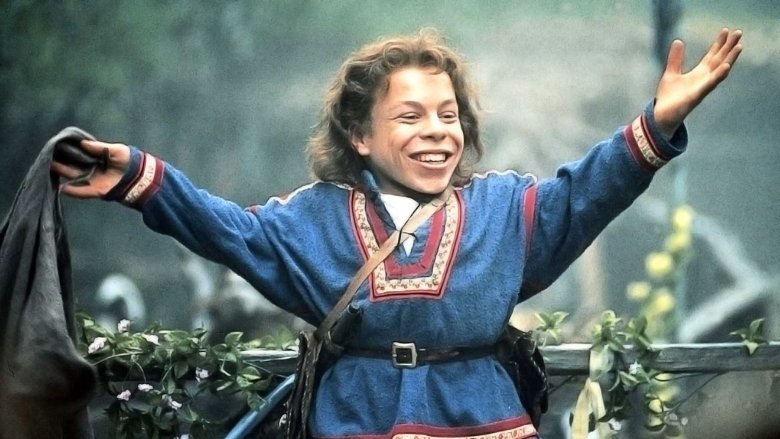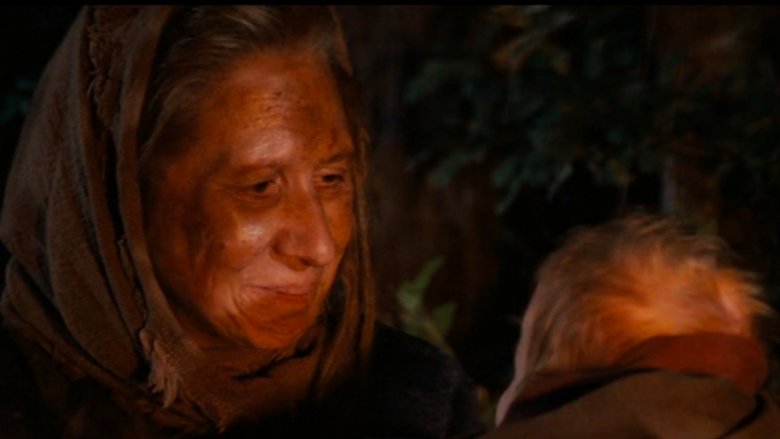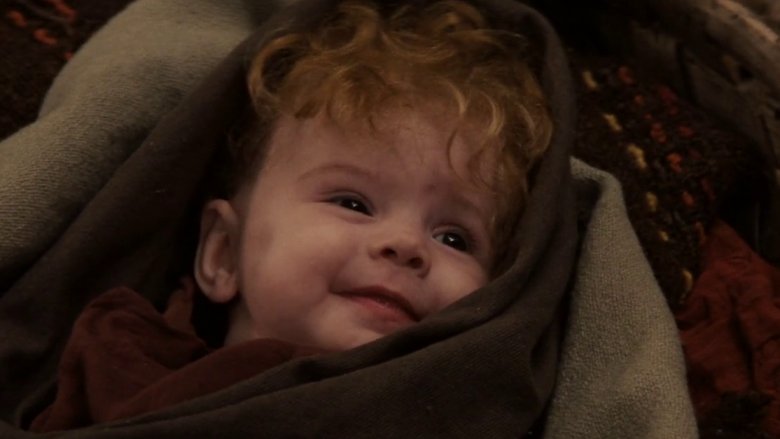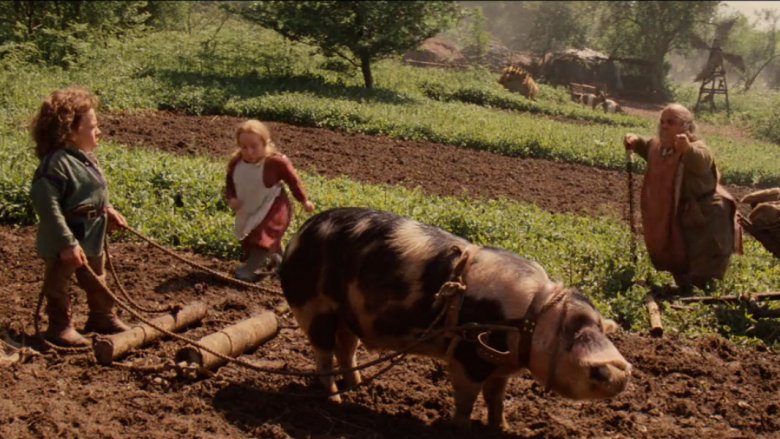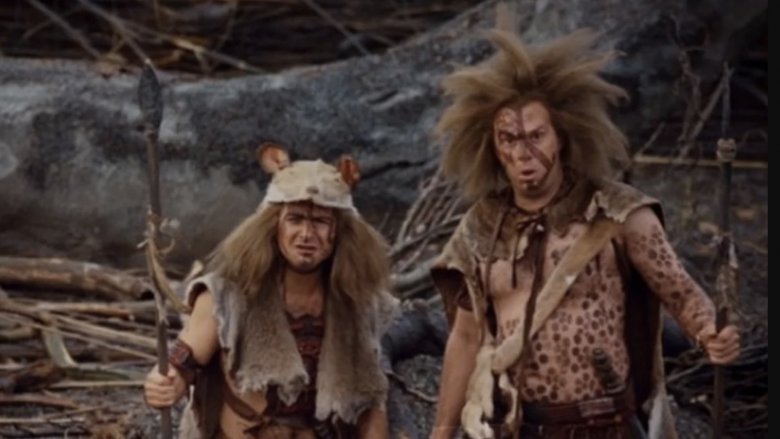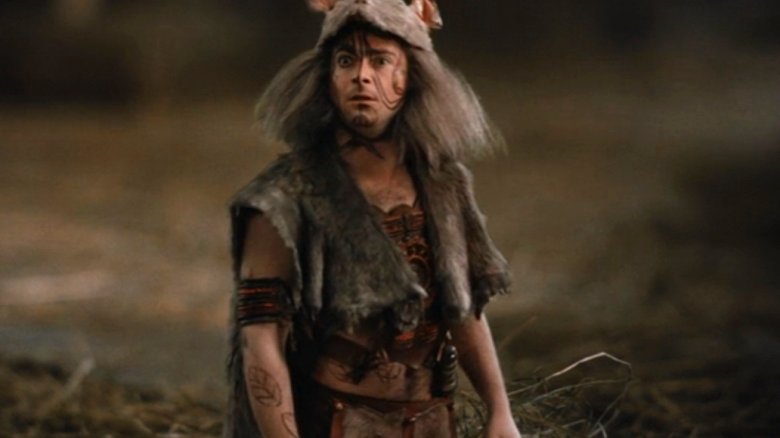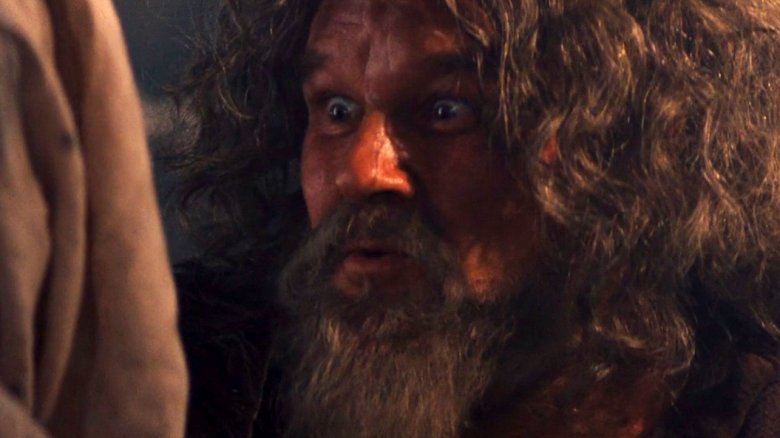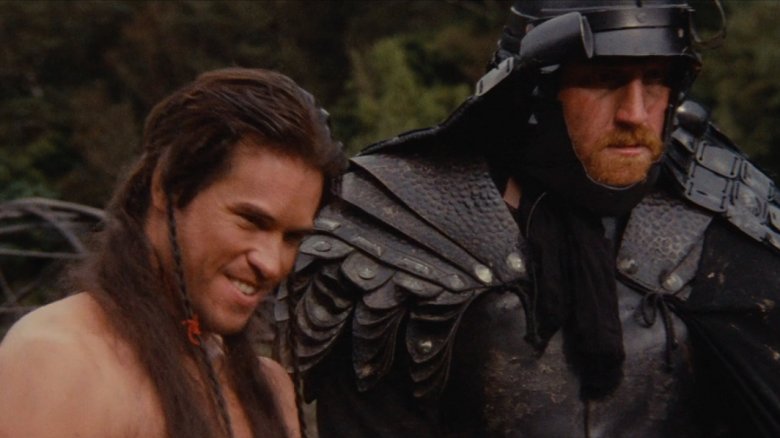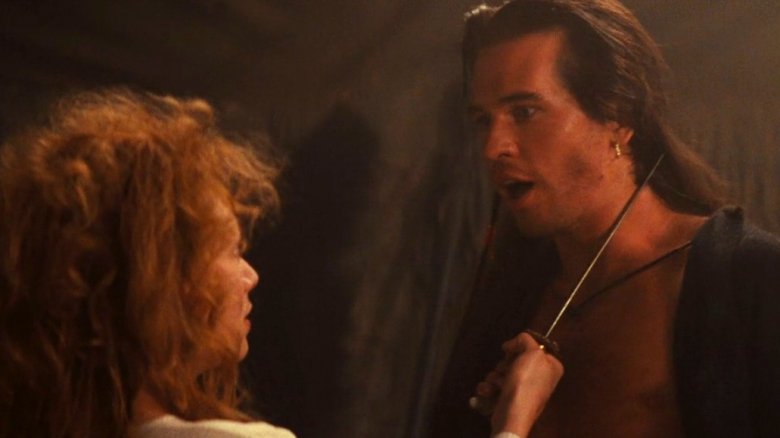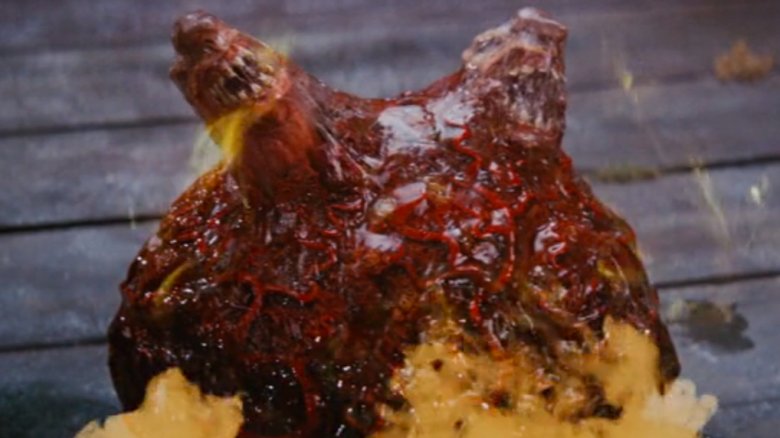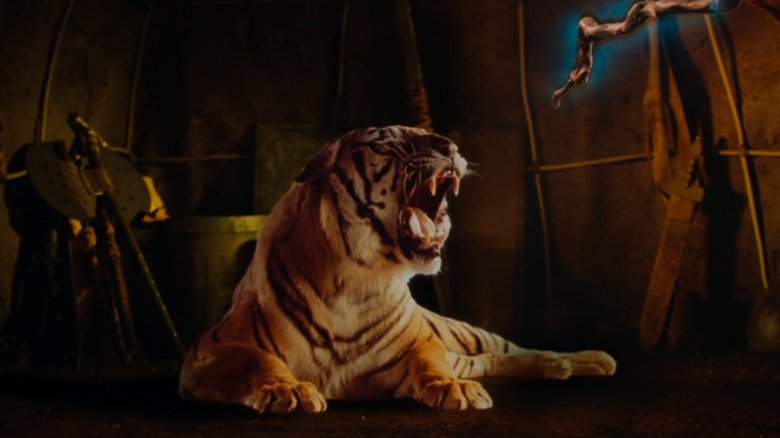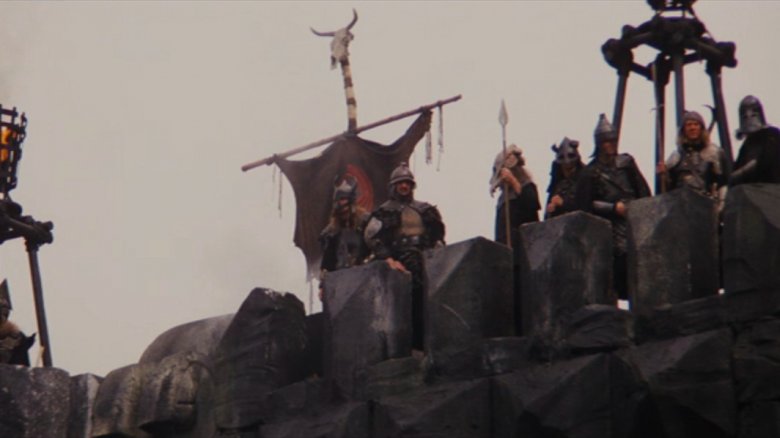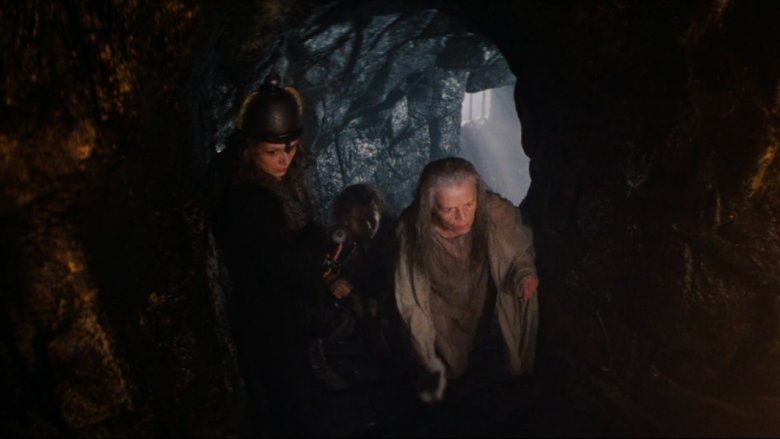Things Only Adults Notice In Willow
Although George Lucas first conceived of the idea for his 1988 fantasy film Willow in 1972, it wasn't until directing a then-12-year-old Warwick Davis in Return of the Jedi in 1982 that Lucas' vision finally solidified. He began writing the script with Davis in mind, telling Davis' mother in 1983 that he was working on a film for her son "for a few years ahead, when Warwick is a bit older."
Davis would be 17 when Willow finally went into production. The story follows a farmer named Willow Ufgood, a Nelwyn (little person) who leaves his peaceful village to find a Daikini (average-height person) to care for a baby his children found on the bank of the river. Little does Willow realize that this baby is Elora Danan, the child prophesied to end the evil reign of the sorceress Queen Bavmorda (Jean Marsh). Soon, accompanied by disgraced swordsman Madmartigan (Val Kilmer), Willow finds himself swept up in an epic adventure to save Elora and deliver the realm from Bavmorda's rule.
If you first experienced Willow as a child in the '80s, you probably remember it for the thrilling action, sweeping score, rich world-building, and endearing characters. All of those elements are most definitely still there, but revisiting the film as an adult, you may discover that there are a lot of pieces of Willow that went right over your head as a kid. It's time to break down the things you only notice about Willow as an adult.
The midwife is with Elora for months
Willow opens on Elora Danan's birth in the prisons of Bavmorda's castle, where she's rounded up every pregnant woman in the kingdom in search of the child in the prophecy. Upon finding the identifying mark on Elora's arm, soldiers leave to report to Bavmorda. However, before they return, Elora's mother convinces a midwife to smuggle her out of the prison, sparing her life.
As the opening credits play, we see the midwife traveling with Elora over a lush landscape, only to die by the end of the credits when Bavmorda's Death Dogs find her and rip her apart. Before she dies, though, she makes a small raft and places Elora on it, sending her downriver to Willow's farm, although she has no way of knowing where the baby will wind up.
The midwife sequence comes and goes in just a couple of minutes, making it seem as though she's only with Elora for a few days. However, it's likely that much more time has passed by the time the Death Dogs catch up to her, judging by how much Elora has grown. When we first see the baby, she's a tiny newborn, but by the time the midwife sends her down the river, she's clearly several months older, with a full head of curly red hair. Knowing they spent months together makes the midwife's sacrifice even more poignant and establishes her as the first hero of the film, before we've even met the title character.
Willow's initial plan would've killed Elora
Upon discovering that his children have found a Daikini baby by the river, Willow's first thought is of the inconvenience the baby poses to his family, not to the many hazards a makeshift raft on a rushing river could pose to a helpless infant. He suggests to his children that they should simply push the basket holding Elora back into the river, sending her away with the current, and says they should pretend they never saw her.
Fortunately for everyone, Willow is interrupted by the town prefect, Burglekutt (Mark Northover), before he can put his likely deadly plan into action. By the time he's able to return to the river, his wife Kaiya (Julie Peters) has found the baby, and takes matters into her own hands by pulling her out of the river and bringing her into the Ufgood home. If Kaiya hadn't intervened, Willow may have done something incredibly foolish that could've easily resulted in Elora drowning, dying of exposure, or getting eaten by wild animals. For the rest of the movie, Willow shows himself to be a protective and loving guardian of Elora, but only because his wife had the good sense to save him from himself first.
There's an entire subplot about Willow's farm playing out in the background
As a child, it's easy to gloss right over the argument that Burglekutt and Willow have about the Ufgood farm, paying no mind to their mention of debts and planting and contraband seeds. The biggest takeaway for a kid is that Burglekutt is mean and we don't like him. However, as an adult, Burglekutt's plan is both clear and shrewd: he's after Willow's farm, and he knows exactly how he plans to get it.
It sounds as though Willow already owes Burglekutt some money before the start of the film, although what the debt is for, we never learn. Burglekutt then accuses the Ufgoods of stealing seeds from him, which would've added to their debt and made it easier for Burglekutt to claim their property as compensation, but when he can't prove the theft, he gets frustrated and storms off, saying they'll never get their planting done before the rains come, which means their harvest won't be plentiful enough to pay their debt.
When Burglekutt nominates Willow to lead the expedition to find a guardian for Elora, it probably has little to do with what's best for the baby, and everything to do with the prefect's scheme to claim the Ufgoods' land. If Willow is gone, it'll be even more difficult for the Ufgoods to finish their planting in time. By leaving his farm, Willow may be risking more than just his life — he could possibly lose his family's home as well.
We have questions about the Brownies' hunting techniques
After giving Elora to Madmartigan and turning back to head home, Willow and his best friend Meegosh (David J. Steinberg) are shocked when they see Elora being carried away by an owl flown by Brownies — tiny, excitable people no bigger than the size of a hand. Willow and Meegosh start to chase the owl, but the Brownies shoot needle-sized arrows at them, driving them toward what turns out to be a pit in the forest floor disguised by leaves and branches.
When Willow and Meegosh regain consciousness, they've been pulled out of the hole and tied up, in a scene which is reminiscent of Gilligan's Island. To a child, nothing seems amiss in this progression of events, but as an adult, one can't help but wonder exactly how the Brownies managed to get Willow and Meegosh — who are many hundreds of times their size — out of that hole, and also where the hole came from in the first place. The Brownies aren't shown to have any sort of advanced technology, yet we're to believe that they hunt by digging holes the proportional size of multiple football stadiums stacked on top of one another, then drag their prey out of those holes using nothing but their teensy, toothpick-sized arm muscles. Nothing about this adds up.
The implications of the Dust of Broken Heart are horrifying
When Willow stops at an inn to try to find food for Elora, his new Brownie accomplice, Rool (Kevin Pollak) notices an attractive woman sitting at a table and decides to break out the Dust of Broken Heart in order to woo her. His companion Franjean (Rick Overton) warns against this plan, explaining that the dust was made by fairies and shouldn't be used trivially.
Before Rool can use the dust, though, he accidentally hits himself in the face with the bag, and winds up romantically attracted to a cat. However, the implications of the Dust of Broken Heart are deeply disturbing, to say the least. Not only does it appear to be indiscriminate in the attractions it stirs, making a person feel like they're in love with the first creature they see, regardless of species, but it appears to override their entire sense of agency as well. Later in the film, the Dust of Broken Heart will make Madmartigan feel overwhelmingly drawn to Sorsha (Joanne Whalley), a person he hates.
As a kid, the Dust of Broken Heart seems harmless and funny, but when one considers its effects as an adult, there are clear parallels to real-life drugs known for being slipped to individuals without their consent and overriding their ability to offer consent. None of that is remotely funny, and the idea that Willow plays what is essentially a magical roofie for laughs should definitely be cause for some significant side-eye.
There's nothing funny about Llug
Speaking of the possibility of sexual assault being played for laughs, let's talk about Llug. Llug is barely a character; introduced as Madmartigan's nameless paramour's husband, he's a hulking, grunting bear of a man who seems to have no discernible personality beyond "brutish" and "lascivious." In order to avoid Llug killing Madmartigan when he discovers him with his wife — not in a hyperbolic way, but in an "actual murder" way — Madmartigan disguises himself as the wife's cousin, Hilda.
Upon meeting "Hilda," Llug immediately propositions her, groping at her chest as she says no. We know "Hilda" is really Madmartigan and his seemingly ample bosom is actually stuffed with apples, but when one considers Llug's actions from his own perspective, there's really nothing amusing about it. Not only is he coming on to someone who is presumably his wife's relative with the oh-so-enticing pickup line, "Wanna breed?," but he's not even giving her an opportunity to consent, pawing at her roughly before she has the chance to utter her undeservedly polite "Tempting, but no."
As a child, watching this scene play out seems funny and harmless, but as an adult, you just know that if that's the way Llug behaves with Hilda, that he's probably been just as aggressive toward other women. We can only hope that Llug was arrested for attacking Sorsha's soldiers after this scene and spent the rest of the film in a jail cell, far away from any women he might ask to "breed."
Madmartigan may have tried to lead Sorsha's troops away from Willow
After Willow and Madmartigan reach the shore opposite the island of the sorceress Fin Raziel, they part, with Willow continuing on to the island and Madmartigan striking out on his own. However, no sooner has Willow returned with Raziel than Sorsha's soldiers surround him, and we see that they've captured Madmartigan.
Before this scene, Willow and Madmartigan had seemed to find a mutual respect for one another. It's been a while since Madmartigan wielded the slur "peck" against Willow, and the two part on good terms. However, when Madmartigan shows up with the soldiers, his first words to Willow are, "Sorry about this, peck." It's jarring to hear the word pass his lips again when it seemed like he'd grown beyond that.
Additionally, a soldier says, "I told you we could find them without your help," implying that Madmartigan offered to lead the way back to Willow and the baby. None of this fits with the Madmartigan we saw previously, who helped Willow and seemed to care about Elora. You might be able to explain it away as him being mad at Willow for involving him in the conflict, but considering he warms up again as soon as they're both captured together — even carrying Willow on his shoulders when he falls — it seems more likely that Madmartigan was putting on an act with the soldiers, perhaps intending to lead them away from Willow, and when that failed, attempting to downplay Willow's significance to him in order to keep him safe.
The vibe between Madmartigan and Sorsha in her tent is a little icky
After seeing the effects of the Dust of Broken Heart earlier in the film, we get a more complete showcase of its powers when Madmartigan is accidentally exposed to the dust while attempting to break out of the cage where he and Willow are being held. Even though we've previously seen Rool get twitterpated by a cat, the dust doesn't take hold of Madmartigan until he catches sight of Sorsha sleeping in her bed, despite him having already seen Willow, the Brownies, Fin Raziel (as a sugar glider), and baby Elora.
Sorsha tells Madmartigan to get away from her, holding him at bay with a dagger. Repeatedly, she tells him no, and that she'll kill him if he continues to pursue her, but the Dust of Broken Heart keeps him stubbornly professing his "love." Unce the soldiers notice the prisoners have escaped, Madmartigan collapses the tent, and as it falls, he grabs Sorsha and kisses her — and she kisses him back. After that, Sorsha appears unable to shake the effects of the kiss, and later winds up switching sides completely, siding with Madmartigan and Willow against her mother.
As wonderful as it is to see Madmartigan and Sorsha come together later in the film, the tent scene gives off a gross "no means yes" vibe, since she repeatedly tells him to back off, yet appears charmed by his persistence, making it seem as though he was right to ignore her repeated no's — always a terrible idea — and keep chasing her.
Willow is surprisingly gruesome
The '80s were an interesting time for "family friendly" films, many of which contained questionable content that would never make it into a similarly rated and targeted film today. Willow is no exception, especially when it comes to its violence. Probably the most notably gruesome scene is the one in which Willow's spell against one of the trolls that have infested Tir Asleen misfires, and results in the troll peeling off its own skin, then having two Alien-like heads sprout from its bloody organs — but there are also other scenes.
There's the moment a few minutes later, when the two-headed ex-troll creation morphs into a giant fire-breathing monster, which Madmartigan defeats by stabbing it through the cranium so that its head explodes the next time it attempts to breathe fire. And let's not forget the part during the final battle in which Madmartigan kills General Kael (Pat Roach) by pulling him down on his own serrated sword, which isn't so much graphically violent as it is accompanied by an awful squelching sound that makes it all too easy to imagine what that blade is doing to Kael's body. Sure, there are plenty of movies with a lot more graphic and disturbing content nowadays, but you'd be hard-pressed to find one that parents gleefully show to their five-year-olds.
Raziel was almost half tiger
When Bavmorda uses her dark magic to turn the armies at her gates into pigs, Fin Raziel, sensing danger, instructs Willow to use the magic wand he was given by the fairy Cherlindrea (Maria Holvöe) to keep the two of them intact. Once the danger is past, Raziel tells Willow to transform her into her human self so that she can restore their armies to their true forms.
This is easier said than done, and it takes Willow many recitations of the spell Raziel has taught him to turn her human. As he repeats the magic words, Raziel cycles through a number of animal forms, including a turtle, an ostrich, and a tiger, before finally attaining her human form. Meanwhile, the spell takes an obvious toll on Willow, causing enough physical pain that he eventually collapses from it — fortunately, a split second after Raziel has completed her human transformation.
However, given that each gradual morph from one animal form to the next took a few seconds, if Willow had collapsed a mere second earlier, Raziel might have been stuck in a half-transformed state, with the upper body of a woman and the hindquarters of a tiger. Maybe she would've been able to use the wand to finish transforming herself, but getting Raziel trapped between two forms would've certainly been an interesting way to spend a few minutes.
Bavmorda's soldiers on the wall are worthless
After Bavmorda transforms Madmartigan, Sorsha, and their armies into pigs, she's no longer concerned about the threat they pose, and heads back inside her castle to perform the ritual to banish Elora Danan to a dark alternate realm. However, even though Bavmorda isn't worried about an imminent attack, she still leaves some guards up on the wall as sentries, a job these men presumably hold all the time, whether or not they're worried about an invasion.
As it turns out, Bavmorda should probably have been a little more diligent in training her guards, because they miss a staggering number of developments. Not only do they not notice when the pigs gradually start turning back into people, but they totally miss the fact that the armies at their gates spend the entire rest of the night digging giant holes, each one big enough to fit multiple men on horseback. In the morning when Willow and Raziel (Patricia Hayes) stand seemingly alone amidst the remnants of their army's camp, the castle guards should've been well aware that the rest of the warriors were hiding just out of sight — because they'd been preparing their hiding places all night long. Instead, Kael and his men are utterly blindsided when Arik (Gavan O'Herlihy) and his warriors suddenly burst out of the ground and rush the castle gates.
Willow's final showdown was ahead of its time
It's easy to poke fun at Willow for the elements that haven't aged so well. Few films from the '80s — or from any time period, for that matter — are beyond reproach when held up against modern sensibilities. But there's one thing the film gets truly right: the defeat of Bavmorda.
As a child, it's easy to get swept up in the adventure and fantasy of Willow and not pay much attention to how it plays into the greater social picture of society. However, as an adult, it's hard not to notice just how handily Willow manages to subvert some classic fantasy tropes in its final act. Although Willow does indeed have a swashbuckling archetypical hero in Madmartigan, he spends the majority of the climactic showdown down on the battlefield, fighting against Kael and his men. Meanwhile, the most important confrontation in the film, in which the heroes take on Queen Bavmorda herself, centers around three women and a man with dwarfism — hardly a typical fantasy lineup, yet they take her on with courage and creativity, and ultimately prevail. Madmartigan shows up only after the battle has been won, leaving him little to do besides ask if everyone is okay.
Willow may have its flaws — everything does — but it ends perfectly, in a way that holds up no matter what age you are. Watching Willow triumph over Bavmorda and return victoriously to his village is a lovely culmination to an entertaining and enchanting film that — even for adults — makes it easy to believe that anyone can be a hero.
